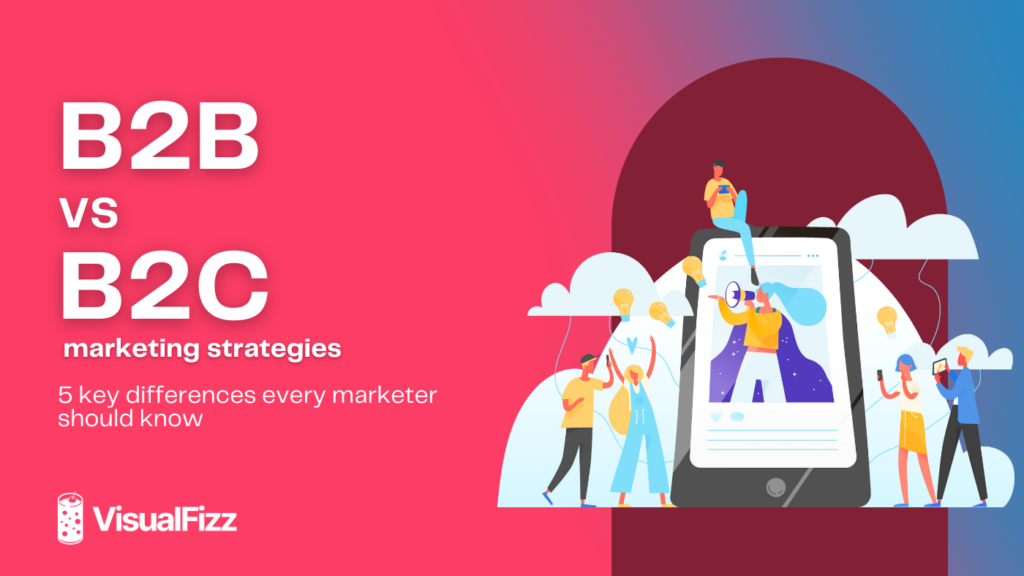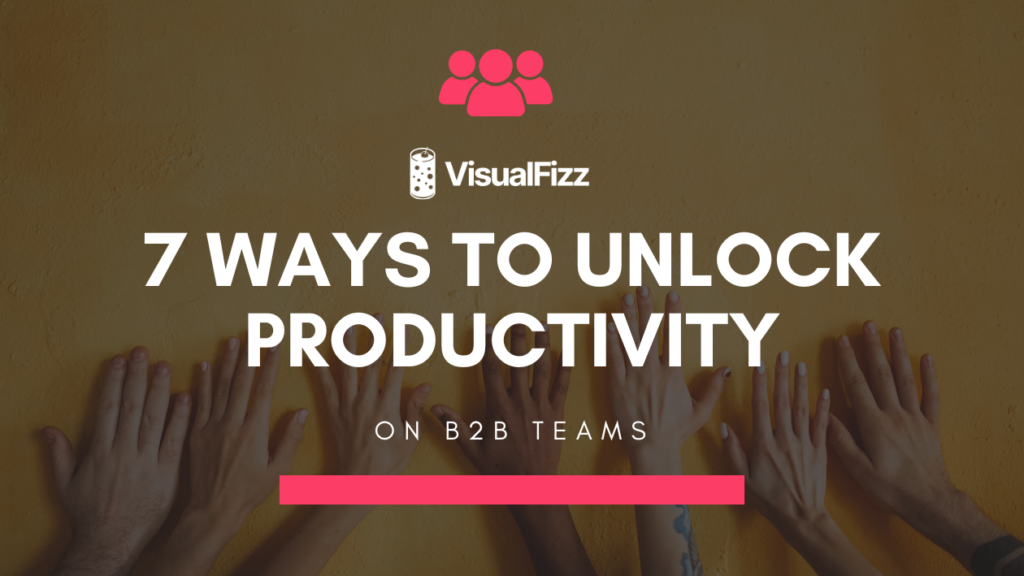
B2C vs B2B Marketing: 5 Key Differences Every Marketer Needs to Know
Both business-to-consumer (B2C) and business-to-business (B2B) companies want to sell their products and services to customers.
However, B2C transactions occur between a business and an individual consumer, while B2B transactions occur between one business and another.
Just like sales professionals, marketing professionals must understand the key differences between B2C and B2B marketing to adapt their strategies for the relevant target audiences.
Whether you’re a seasoned marketer or new to the industry, these 5 differences should stay on your radar to ensure relevance and effectiveness in your campaigns.
Differences Between B2B and B2C Marketing include:
- Target Audience: B2C focuses on individual consumers, while B2B targets other businesses.
- Customer Relationships: B2C aims for quick sales with minimal interaction, whereas B2B emphasizes long-term relationships.
- Branding: B2C branding is about creating memorable consumer experiences; B2B branding seeks to establish industry credibility.
- Purchasing Decisions: B2C purchases are often impulsive and emotion-driven, while B2B decisions are logical and planned.
- Content and Communication: B2C content should be engaging and emotionally appealing, contrasting with B2B’s informative and professional tone.

What is B2C marketing?
B2C marketing is a strategy where a business markets its products or services directly to individual consumers who make one-time or infrequent purchases. For example, an online or local pet store sells its products to individual pet owners. In this case, the B2C customer (pet owner) needs the company’s products (pet food) for personal use (feeding their dog).
The goal of B2C marketing is to raise brand awareness, boost sales, and enhance consumer loyalty.
A B2C marketing strategy utilizes email marketing, social media, and online advertisements to attract, engage, and retain customers.
Examples of well-known B2C companies include Amazon, eBay, Netflix, McDonalds, and Uber.
What is B2B marketing?
B2B marketing is a strategy one business uses to market its products, services, or SaaS (software as a service) to the decision-makers within another business.
B2B customers require products or services from B2B businesses—such as manufacturers and service providers—to resell them, enhance their own offerings, or support their operations. For example, a tyre manufacturer sells its products to automobile manufacturers. In this case, the B2B customer (automobile manufacturers) needs another company’s products (car tyres) to complete or improve its offerings (cars).
B2B marketing aims to build long-term relationships with other businesses, gain repeat customers, and increase revenue.
Examples of well-known B2B companies include Coca-Cola, Salesforce, and UPS.
5 key differences between B2C and B2B marketing
For marketers and agencies serving both B2C and B2B businesses, understanding these five differences is the key to creating a successful marketing strategy. So, let’s take a look:
B2C vs B2B: Customer Relationships
B2C marketing has a transactional focus, with the primary aim to close one-time or infrequent sales. This often doesn’t require a close relationship and is more focused on impulse buying or immediate needs.
Your B2C marketing strategy should aim to push consumers towards products or services on your company’s website. However, without a strong relationship, your B2C customers must have a good experience on your website to convince them to purchase.
Conversely, maintaining long-term relationships with customers is crucial for B2B businesses. So, B2B marketing focuses on building solid and long-term relationships with other companies, with the primary goal of generating leads and enhancing repeat and referral business.
B2C vs B2B: Branding
A successful branding strategy is the number one priority of B2C marketing because brand recognition and a great customer experience ensures that customers will return to purchase more.
To achieve this, marketers must create consistent content that resonates with the consumer, confirms brand credibility, and motivates the consumer to make a purchase.
In B2B marketing, consistent, professional, and accurate branding is essential because other businesses that require your offerings need to recognize your brand as a leader in the industry.
Adjusting your branding to meet the needs of your target audience will drive brand recognition and ramp up your lead generation.
B2C vs B2B: Purchasing Decisions
For B2C marketing, you must create influential content that makes the consumer want a product or service, as consumer purchasing decisions are usually emotion-driven.
Meanwhile, B2B marketing focuses on logical and process-driven purchasing decisions, so open communication is essential to determine whether or not the relationship is a good fit for both businesses.
B2B customers must evaluate the needs of the overall business or the needs of their employees to make purchasing decisions. They can separate these needs into:
- Rational motivations. Rational motivations are driven by finances, such as deciding whether the product or service will be a good investment for their business.
- Emotional motivations. Emotional motivations take employees into consideration, such as deciding whether you will have to cut pay or benefits to afford this investment.
Your B2B marketing strategy must appeal to both the rational and emotional motivations behind the customer’s purchasing decision.
B2C vs B2B: Purchasing Quantity
B2C consumers are shopping for personal use, making them more likely to buy what they need in small quantities. So, B2C marketers must create content that highlights single products or services.
However, B2B customers typically make large purchases for business purposes. So, B2B marketers must highlight discounts or other incentives for large orders.
B2C vs B2B: Marketing Content
In B2C marketing, the content you create should be playful and evoke emotion because customers want to enjoy their purchase.
B2C marketers must use a relatable voice to entice customers to click on an advertisement or marketing campaign. It would help if you used language that your target audience can understand rather than unnecessary jargon that will cause them to turn away.
B2B marketing is the complete opposite, as it relies on the use of industry jargon to show businesses that they are purchasing products or services from an industry expert.
For example, a B2B business that sells large quantities of car tyres does not focus on a content marketing strategy that entices the reader to purchase on impulse; it focuses on removing emotion from the decision and highlighting the positive and negative effects of the purchase.
B2C vs B2B: Target Audience
It is essential to create your marketing strategy with your target audience in mind, whether B2C or B2B.
Individual consumers are the target audience for B2C marketing, so the strategy must focus on reaching as many people as possible and evoking emotional and product-driven purchasing decisions.
The target audience of B2B marketing is other businesses that can use your products or services, so your priority is reaching business prospects and gaining qualified leads.
B2B marketers can segment these audiences by business, industry, or job function.
Using both B2B and B2C: A Hybrid Approach
There may be situations and business structures in which it makes sense to leverage a hybrid approach to B2B and B2C strategies; making it essential for marketers t and decision makers to understand when and why a dual approach might be beneficial.
A hybrid strategy can be particularly advantageous for companies that operate in both consumer and business markets or offer products and services that cater to both sectors.
When to Use Both B2C and B2B Marketing Together
1. Diverse Product Offerings: Companies like Microsoft exemplify successful integration of both marketing strategies. They offer consumer products such as personal computers and software directly to individual customers, while also catering to businesses with cloud solutions and enterprise services.
By applying both B2C and B2B marketing principles, they maximize their market coverage and revenue opportunities.
2. Enhanced Brand Recognition: Utilizing both B2C and B2B strategies can boost a company’s brand recognition across different market segments. For example, a strong B2C presence can increase brand visibility and familiarity, which in turn can reinforce the company’s reputation in B2B circles.
This crossover appeal can make B2B clients more confident in their business dealings with the company.
3. Comprehensive Market Insights: Engaging with both individual consumers and business clients provides a wealth of data across different demographics and industries.
This dual approach allows companies to refine their marketing tactics based on a broader set of insights, leading to more effective and targeted campaigns in both arenas.
4. Risk Mitigation: By operating in both B2C and B2B markets, companies can diversify their revenue streams, which can provide a buffer against market volatility.
If one segment underperforms, the other might compensate, stabilizing overall business performance.
5. Cross-Promotional Opportunities: There are unique cross-promotional opportunities in managing both B2C and B2B strategies. For instance, a company can use its B2C channels to raise awareness about its B2B offerings.
Similarly, showcasing strong B2B partnerships can enhance consumer confidence in the B2C market, as customers see that large, reputable businesses trust the brand.
Conclusion
Marketers must recognize the fundamental differences between B2C and B2B marketing to effectively target individual consumers or business clients.
B2C marketing focuses on quick, emotional purchases with a broad reach, while B2B marketing emphasizes logical decision-making and relationship building within specific industries. Understanding and implementing these distinct strategies will significantly enhance market performance and customer engagement.
Recognizing the differences between B2C and B2B marketing will help marketers better target the right audiences and enhance customer loyalty in an increasingly competitive industry.
It is also essential to understand that some marketers may need to use both strategies – depending on the business.
Note: this post, and the views and advice included, are a guest post from a 3rd party company that is not VisualFizz. Please reach out to our team directly if you’d like to discuss how the content included in this guest post could be relevant to your marketing goals.
Want to be featured on the VisualFizz blog? Learn how to Write for Us.
Publishing Date:







